![]()
Paperweights From Other Countries
![]()
Paperweights From Other Countries
The glass paperweights on this page are from other countries not well known for their paperweights. Some of these are inexpensive fun paperweights.
If you would like to purchase
any of these paperweights, e-mail me at: aport@paperweights.com
| 6209 | Peter Raos 1995 Monet Series Spring
Paperweight. dated 1995. This paperweight
features a impressionist interpretation of a wildflower meadow
created using hundreds of millefiori flowers mixed with green
flecks and aventurine. It was made by Peter Raos in New
Zealand and is part of his four season Monet Series of
paperweights. It is signed on the side "Raos 1995 New
Zealand". This is a hard to find item. A wonderful
paperweight. Peter Raos works as a glass artist in Devonport, New Zealand since starting his studio in 1979. He is a graduate of the University of Auckland Elam School of Fine Arts and Design. Large size: 2 13/16” diameter by just under 3
7/16" tall. For extra pictures, click on the picture at the right and the following links: Large picture$345 postage paid in the US. Click on the picture to see a larger image. |
Click
on the picture to see a larger image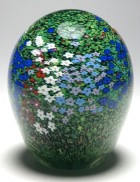 |
| 6005 | Dramatic Reijmyre (Sweden) Sunfish
Figural Paperweight. circa 1950-1960. This
large
figural Sunfish paperweight was made at the Swedish firm Reijmyre
and is signed with a gold foil label "REIJMYRE 1810 SWEDEN".
Possibly made by one of the Marcolin brothers. The
paperweight has an interesting green and brown textured interior
that reminds me of later work by the Marcolin brothers at
Färe-Marcolin. A fantastic example. Reijmyre was founded in Sweden in 1810 by Johan Jacob Graver. During the early 20th century, Reijmyre produced high quality cameo glass. The company changed hands many times over the years. Lennart Rosen took over in 1950, and hired designers including Johnny Mattsson, Paul Kedelv and Bert Kindaker. The Italian brothers Josef and Benito Marcolin worked at Reijmyre just before starting their own company in 1961. The Reijmyre glassworks is still in production today. Large size: 6 1/4" wide by 4 9/16" high by 1
9/16" thick. The base is polished
flat. For extra pictures, click on the picture at the right and the following links: Large picture$45 postage paid in the US. Click on the picture to see a larger image. |
Click
on the picture to see a larger image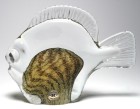 |
| 5700 | Magnum Hadeland Gro Bergslien
Sommerfeldt Abstract Painterly Paperweight. circa
1964-1986. This magnum abstract Hadeland paperweight was
designed by Norwegian designer Gro Bergslien Sommerfeldt. It
has a soft irregular shape with splotches of contrasting color on
a pink surface. The effect is a painterly experiment in
glass. It is signed on the base "Hadeland S.B." (for
Sommerfeldt Bergslien). It also has a paper label "HADELAND
H NORWAY" and a second smaller label on the base. It comes
with its original small brochure. It is a warm and
comfortable addition to any collection of abstract
paperweights.
Hadeland Glasswerk was
founded in 1762 in Jevnaker, Norway and began producing glass
bottles, jars, and household glassware in 1765. During
the 1800's, production moved to wine glasses, bowls and vases,
in styles popular in other European countries. Hadeland
began to create their own designs in the 1920's with a number
of prominent artists and designers. The company is still
in production today and is one of the largest glassworks in
Northern Europe. Very large size: 3 11/16" diameter by 2 3/16"
high. The base is polished flat. For extra pictures, click on the picture at the right and the following links: Large picture$95 postage paid in the US. Click on the picture to see a larger image. |
Click
on the picture to see a larger image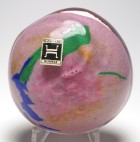 |
| 5058 | Dramatic Marcolin (Sweden)
Sfumato Technique Owl Figural Paperweight. circa
1961-1991. This dramatic owl figural paperweight
demonstrates the excellence of Marcolin's use of the sfumato
technique to create a smokey feathered appearance. The upper
figural owl portion is clear glass with a round sfumato
paperweight base. There is a slight reddish tinge to the
grey color of the sfumato. This paperweight design was
unique to Marcolin. It is unsigned but I guarantee the
attribution. A fantastic example. Please ignore the white areas, they are glare from the lights. Note: Please review the pictures. This paperweight has a large (3/4") scratch on the back next to base. FM Marcolin Art Crystal or FM
Marcolin Konstglas was founded Sweden in 1961 by two Italian
brothers, Josef and Benito Marcolin. They
learned their glass making skills on the island of Murano,
Venice, and later worked at Reijmyre before starting their own
company. FM stands for Färe-Marcolin. The
company went through several name changes as they moved from
one location to another, including "FM Konstglas, Eneryda", "FM Konstglas, Ronneby",
and then "FM
Konstglas / Marcolin". "Konstglas" is Swedish
for "Art Glass". The company changed its name to FM
Marcolin Art Crystal in 1983, and in 1988-89 changed again to
Marcolin Art Crystal. The Swedish factory closed in
1991, and production was moved to Sardinia, Italy. The
Marcolin brothers left and went their separate ways, Benito
moved back to Sweden, while Josef moved to Austria and
continued production under the name Marcolin Art Crystal,
which is still operating today. The term Sfumato originated in
painting. Leonardo da Vinci described the technique as
blending colors, without the use of lines or borders "in the
manner of smoke". In glass, it is the use of a smokey
bubbled texture to create a soft feathered or quilted
appearance. Marcolin often used sfumato on bird
figurines. Large Size: The rounded base is 3 1/8"
diameter. The paperweight is 3" (80 mm) high. The bottom
ground flat. For extra pictures, click on the picture at the right and the following links: Large picture of the paperweightNew Price $20 (was $69) postage paid in the US. Click on the picture to see a larger image. |
Click
on the picture to see a larger image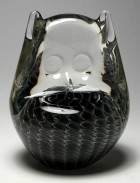 |
| 2797 | Portugal Stylized Floral
Paperweight. circa 1970. Medium paperweight
with stylized flowers. This style is distinctive to
Portugal. The paperweight has four blue and yellow flowers
arranged around an orange four petal flower in the center.
The design is placed over a fine frit ground. Each flower
has a carefully placed bubble in the center. The glass has a
slight yellow tint which may be a reflection from the frit
ground. A very colorful paperweight. Medium size: 2 3/8" diameter by 2 7/16"
high. The base is polished flat. For extra pictures, click on the picture at the right and the following links: Large picture$29 postage paid in the US. Click on the picture to see a larger image. |
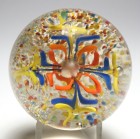 |
| 6253 | Marcolin (Sweden) Controlled Bubble
Figural Green Pear Paperweight. circa
1961-1983. This wonderful green pear figural with
controlled bubbles was made by Marcolin in Ronneby Sweden.
It also has a worn foil label "FM KONSTGLAS HANDIWORK RONNEBY
SWEDEN" (FM Art Glass Handmade Ronneby Sweden on the base.
There is a faint engraving above and below the label "FM" and
"SWEDEN" but I believe those were not added at the factory.
A nice example of early production at Ronneby. Please ignore the white areas, they are glare from the lights. FM Marcolin Art Crystal or FM
Marcolin Konstglas was founded Sweden in 1961 by two Italian
brothers, Josef and Benito Marcolin. They
learned their glass making skills on the island of Murano,
Venice, and later worked at Reijmyre before starting their own
company. FM stands for Färe-Marcolin. The
company went through several name changes as they moved from
one location to another, including "FM Konstglas, Eneryda", "FM Konstglas, Ronneby",
and then "FM
Konstglas / Marcolin". "Konstglas" is Swedish
for "Art Glass". The company changed its name to FM
Marcolin Art Crystal in 1983, and in 1988-89 changed again to
Marcolin Art Crystal. The Swedish factory closed in
1991, and production was moved to Sardinia, Italy. The
Marcolin brothers left and went their separate ways, Benito
moved back to Sweden, while Josef moved to Austria and
continued production under the name Marcolin Art Crystal,
which is still operating today. Size: 2 3/8" diameter by 4 7/16" high. The
base is polished flat. For extra pictures, click on the picture at the right and the following links: Large picture$25 postage paid in the US. Click on the picture to see a larger image. |
Click on the picture
to see a larger image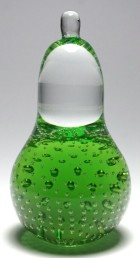 |
| 4084 | Waterford Crystal Lismore Diamond
Shape Paperweight. circa 2000 or later. This is
an impressive Waterford crystal "diamond" shape paperweight.
It has a Waterford signature with a seahorse etched on the base,
dating it to 2000 or later. Note: This is a molded product that has the appearance of cut glass. The diamond pattern is discontinued. It is available at Replacements for $119.95. The Waterford Glass House was founded in 1783 by George and William Penrose. The company is best known for its fine crystal products made in Waterford, Ireland. The original company closed in 1851 because of finances. It was reborn in 1947 with factories Dungarvan and Kilbarry (Ireland) and recruited glassworkers from Czechoslovakia and other parts of Europe. From 1997 to 2008, the Rosenthal AG owned most of the British-Irish Waterford Wedgwood Group. The financial crisis of 2008 resulted in further changes in ownership. In 2015, Fiskars Corporation, a global supplier of consumer products for the home, garden and outdoors, acquired the WWRD group of companies including Waterford, Wedgwood, Royal Doulton, Royal Albert and Rogaška. The Lismore line of Waterford Crystal was created in 1952 by Waterford's Chief Designer, Miroslav Havel. He drew inspiration for the pattern's signature diamond and wedge cuts from the Gothic architecture of Lismore Castle, a historic site located in County Waterford, Ireland. Although Lismore dates from 1952, the Waterford Logo with a Seahorse was not etched until 2000. Large size: 3 5/16" at its widest by 2 5/16"
high. The base is polished concave and finished with a
star pattern. This is a molded product that has been
polished to look like cut glass. For extra pictures, click on the picture at the right and the following links: Large picture$59 postage paid in the US. Click on the picture to see a larger image. |
Click
on the picture to see a larger image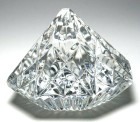 |
| 5513 | Magnum Rosenthal Studio-Linie Swirl
Paperweight. circa 1971 or later. This very
large and wonderful Rosenthal swirl paperweight features a swirl
of white glass over a clear crystal ground. It is acid etch
marked on the base with the name Rosenthal, the crown and crossed
swords logo, and Studio-Linie underneath. A dramatic
addition to any collection of glass paperweights. Rosenthal was founded in 1879 as a family business. Originally the focus was porcelain manufacture and porcelain painting. In 1960, the Rosenthal Studiohaus was opened in Nuremberg and in 1965 the name was changed briefly to Rosenthal Glas & Porzellan AG and then in 1960 to Rosenthal AG in 1969. From 1997 to 2008, the Rosenthal AG owned most of the British-Irish Waterford Wedgwood Group. The Studio-Linie mark was used from 1971 to at least 1995. Since the Rosenthal mark on this paperweight does not identify the country of origin (normally Germany), it is possible that the paperweight was made at Waterford, but I have no evidence one way or the other. Very large size: 4 5/15” diameter by 2 15/16”
high. The base is polished flat. It weighs just
under three pounds (47.1 ounces). For extra pictures, click on the picture at the right and the following links: Large picture$95 postage paid in the US. Click on the picture to see a larger image. |
Click
on the picture to see a larger image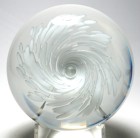
|
Back to Allan's Paperweights (www.paperweights.com)
Revised 9/16/2025 EI9